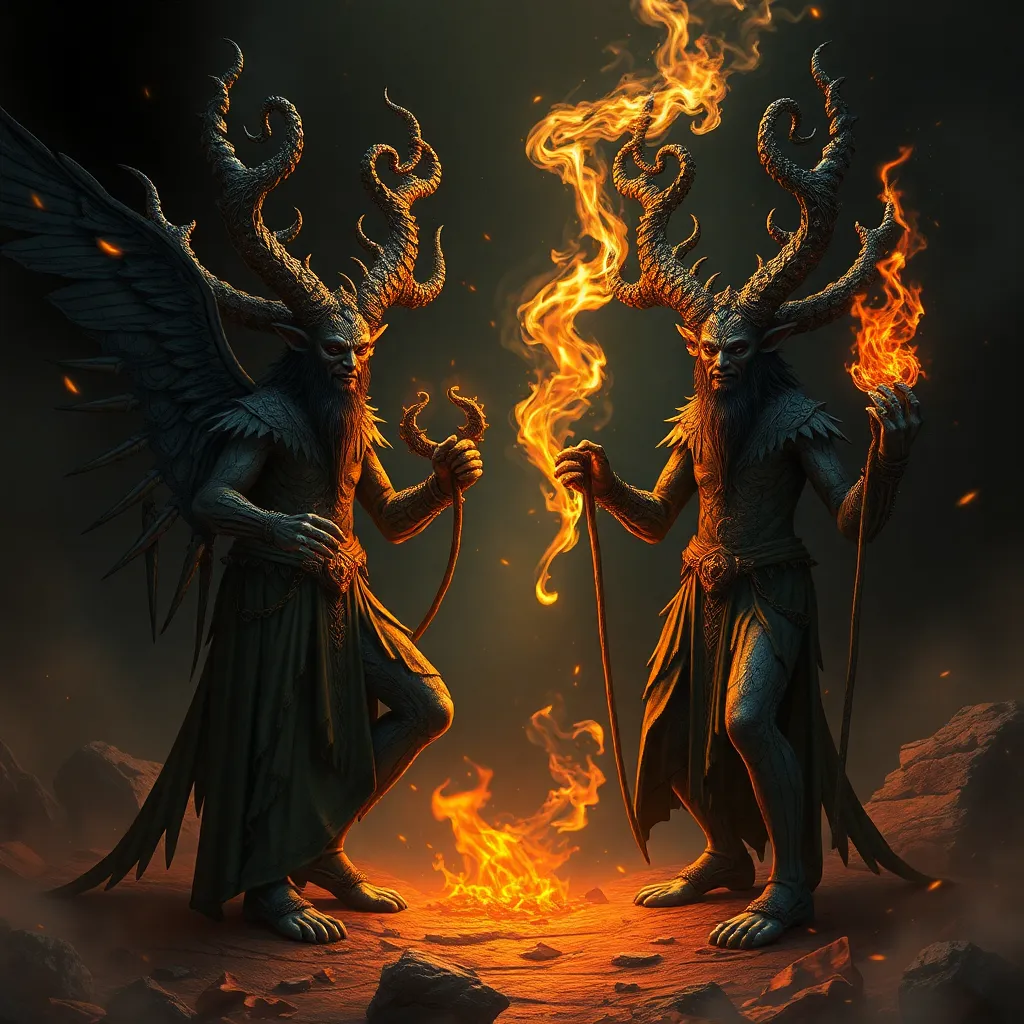The Empusa in Literature: Exploring the Demon’s Role in Poetry, Plays, and Novels
I. Introduction
The Empusa, a figure steeped in myth and mystery, is a demon from ancient Greek mythology that has captivated the imagination of writers and poets for centuries. Often portrayed as a shape-shifting entity, the Empusa is known for its seductive and dangerous nature, embodying themes of temptation and peril.
Originating from the rich tapestry of Greek mythology, the Empusa is often associated with the goddess Hecate and is described as a creature that preys on men, particularly those who are vulnerable or alone. Its portrayal in literature reflects the cultural perceptions of femininity, sexuality, and power dynamics throughout history.
This article aims to explore the representation and role of the Empusa across various literary forms, including poetry, plays, and novels, highlighting its thematic significance and cultural impact.
II. Historical Background of the Empusa
A. Ancient Greek mythology and early references
The earliest references to the Empusa can be traced back to the works of ancient Greek playwrights and poets. In mythological texts, Empusa is depicted as a servant of Hecate, embodying the darker aspects of femininity and the supernatural. Greek tales often describe her as a beautiful woman who transforms into a terrifying monster, emphasizing her duality.
B. The evolution of the Empusa character through literature
Over the centuries, the Empusa’s character has evolved significantly. From its initial portrayal as a monstrous figure in Greek tragedies to more nuanced representations in later literature, the Empusa has adapted to reflect changing societal attitudes toward women and demons. The transition from ancient to modern literature showcases the shifting perceptions of female power and sexuality.
C. Influence of cultural perceptions on the portrayal of Empusa
The cultural context in which the Empusa is depicted greatly influences its characterization. In societies where femininity is associated with danger and seduction, the Empusa serves as a powerful symbol of the fears and desires surrounding women. This dynamic has allowed the Empusa to remain relevant in discussions of gender and sexuality in literature.
III. The Empusa in Poetry
A. Analysis of notable poems featuring Empusa
The figure of the Empusa has inspired numerous poets, leading to rich imagery and themes that explore its complex nature. Notable poems often feature the Empusa as a symbol of seduction and danger, reflecting the tensions between desire and fear.
1. Themes and imagery
- Temptation: The Empusa often represents the allure of the forbidden, drawing characters into situations of moral ambiguity.
- Transformation: Poets frequently highlight the shape-shifting abilities of the Empusa, using this imagery to explore themes of identity and deception.
- Fear: The presence of the Empusa evokes a sense of dread, emphasizing the dangers that lurk behind beauty and attraction.
2. Symbolism of the Empusa in poetic narratives
In poetry, the Empusa symbolizes the intersection of beauty and horror. Poets utilize this duality to explore deeper emotional truths, often reflecting societal anxieties regarding femininity. The Empusa becomes a vessel through which themes of mortality, desire, and power dynamics are examined.
B. Influence of Empusa on poetic styles and movements
The Empusa has influenced various poetic movements, including Romanticism and Surrealism, where the exploration of the subconscious and the uncanny became prominent. Poets have drawn on the figure of the Empusa to challenge traditional notions of love and desire, infusing their works with a sense of mystery and allure.
IV. The Empusa in Plays
A. Examination of dramatic representations of Empusa
The Empusa has also made its mark on the theatrical stage, with several playwrights incorporating this demon into their works. The dramatic portrayal of Empusa often serves to heighten tension and explore themes of seduction and betrayal.
1. Notable playwrights and their works
- Aeschylus: Early references to Empusa in his works highlight the creature’s menacing qualities.
- Sophocles: In his tragedies, Empusa can be seen as a metaphor for the destructive power of desire.
- Contemporary plays: Modern interpretations often reimagine the Empusa as a complex character, reflecting societal struggles.
2. The role of Empusa in theatrical themes and character development
In plays, the Empusa often serves as a catalyst for conflict, driving characters to confront their desires and fears. The character’s dual nature allows for rich character development, as protagonists grapple with the implications of their interactions with this demon.
B. Impact of the Empusa on the genre of tragedy and horror
The presence of the Empusa in tragedy and horror has contributed to the exploration of psychological themes, such as the nature of evil and the complexities of human desire. As a figure that embodies both beauty and horror, the Empusa enhances the emotional depth of dramatic works, leaving audiences with lingering questions about morality and the human condition.
V. The Empusa in Novels
A. Exploration of Empusa’s portrayal in classic and contemporary novels
In literature, the Empusa has appeared in both classic and contemporary novels, often serving as a powerful symbol of temptation and danger. Writers utilize the character to explore themes of sexuality, power, and the supernatural.
B. Character analysis and narrative significance
Empusa’s character is frequently portrayed as both alluring and threatening. This duality creates tension within narratives, as characters navigate their relationships with the Empusa, often leading to their downfall. The Empusa’s presence in novels highlights the complexities of desire and the moral implications of seduction.
C. Themes of seduction, danger, and the supernatural associated with Empusa
The recurring themes of seduction and danger associated with the Empusa resonate throughout literary history. Authors leverage the character to discuss the precarious nature of desire and how it can lead to both personal and societal ruin. The supernatural aspect of the Empusa enhances these themes, creating a sense of mystery and foreboding.
VI. Comparative Analysis: Empusa vs. Other Demonic Figures
A. Similarities and differences with other mythological demons
When compared to other demonic figures, such as Lilith and succubi, the Empusa shares similarities in its role as a seductress but differs in its origins and cultural significance. While Lilith is often viewed as a symbol of female empowerment, the Empusa embodies the fears of female sexuality and its potential for destruction.
B. Cultural significance of Empusa compared to figures like Lilith and succubi
The Empusa’s cultural significance lies in its reflection of societal anxieties regarding women and power. Unlike Lilith, who has been embraced as a feminist icon, the Empusa remains a figure of fear, representing the dangers of unchecked desire.
C. The unique role of Empusa in shaping literary demonology
The Empusa occupies a unique space in literary demonology, as it serves as both a cautionary figure and a symbol of the complexities of femininity. This dual role allows the Empusa to influence various literary traditions and continues to inspire writers to this day.
VII. Thematic Exploration of Empusa’s Role in Literature
A. Feminine archetypes and the representation of female demons
The Empusa is emblematic of the archetype of the female demon, often representing the darker aspects of femininity. This portrayal raises questions about societal views of women and their roles, particularly in relation to power and sexuality.
B. The interplay of fear, desire, and power dynamics
The Empusa embodies the interplay of fear and desire, serving as a reminder of the complexities of human relationships. Characters drawn to the Empusa often find themselves entangled in power dynamics that challenge their moral compass, reflecting broader societal issues.
C. The moral implications of Empusa’s character in literary contexts
The moral implications of the Empusa’s character invite readers to engage in discussions about ethics, desire, and the consequences of seduction. Through its portrayal in literature, the Empusa serves as a lens through which to examine the complexities of human nature.
VIII. Conclusion
In summary, the Empusa has made significant contributions to literature across various forms, serving as a powerful symbol of seduction, danger, and the complexities of femininity. Its portrayal in poetry, plays, and novels reflects the evolving cultural perceptions of women and their roles in society.
The lasting impact of the Empusa in modern storytelling highlights the importance of examining how demons and mythological figures can shape our understanding of human nature and morality. As literary studies continue to evolve, future research may further explore




